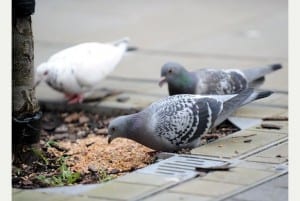
by Pigeon Patrol | Feb 17, 2014 | Animal Deterrent Products, Bird Deterrent Products, Pigeon Spikes, UltraSonic Bird Control
Pigeon Patrol is happy to pass on some Pigeon Prevention Guidelines
Urban pigeons are descendants of the Rock Dove, a species of pigeon domesticated by humans for food and as pets. Birds that were released or escaped became today’s city pigeons.
Pigeons can carry diseases and parasites that can be transmitted to humans, including histoplasmosis, cryptococcosis, and psittacosis.
Pigeons have no natural enemies in urban areas and reproduce quickly. Pigeon overpopulation can lead to increased property damage and higher disease rates among pigeons. Accumulated bird debris may attract mice, rats, and flies.Pigeon droppings are as much a concern as the pigeons themselves. On average, a well-fed pigeon deposits 25 pounds of droppings a year. Pigeon feces are unsightly and can damage buildings, vehicles, trees, shrubs, lawns, benches and park fountains.
Pigeons have four basic needs in order to survive: food, shelter, the ability to reproduce, and safety from predators. If any of these basic needs are disrupted, the pigeons will move away.
Food
Pigeons will eat anything they can fit into their bill. If they cannot find food in an area, they will look for it elsewhere. Follow these steps to keep pigeons from eating at your house:
- Don’t feed the pigeons.
- Remove unsecured bird feeders and routinely clean up spilled seed.
- Cover trash cans and keep area around the cans clean.
- Don’t leave uneaten pet food outside.
- Pick up after your pets. Pigeons will eat pet waste.
- Empty containers of water.
Shelter
Pigeons seek shelter at night and congregate at roosting sites during the day. Pigeons feel safe in a sheltered area where they are not easily seen. In urban areas, pigeons roost in trees, abandoned structures, rafters, beams, along building eaves and awnings, and under bridges. These areas can be easily modified to discourage roosting.
- Block access to interior roosting and nesting sites by using Ultra-flex Bird Spikes, bird netting or wire mesh.
- Bird Spikes can be attached to any area where pigeons roost. These devices consist of a solid base with dull prongs sticking out at all angles. This prevents birds from landing.
- Apartment residents can install sonic and ultrasonic bird repellers to deter the pigeons.
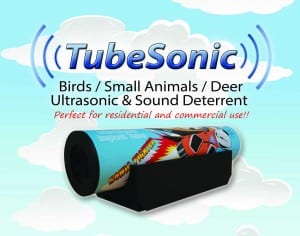
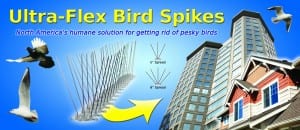
Breeding
Remove nests to discourage breeding. Pigeons will reuse the same nest throughout a breeding season. Keep removing any rebuilt nests. After a few failed attempts, the pigeons will nest somewhere else.
Safety
In an urban environment, pigeons have few natural predators. However, by instinct, pigeons have a fear of being preyed upon. Pigeons may be deterred from locations by hanging “frightening” devices, but these items will only deter the birds for so long.
About Pigeon Patrol:
Pigeon Patrol Products & Services is the leading manufacturer and distributor of bird deterrent (control) products in Canada. Pigeon Patrol products have solved pest bird problems in industrial, commercial, and residential settings since 2000, by using safe and humane bird deterrents with only bird and animal friendly solutions. At Pigeon Patrol, we manufacture and offer a variety of bird deterrents, ranging from Ultra-flex Bird Spikes with UV protection, Bird Netting, 4-S Gel and the best Ultrasonic and audible sound devices on the market today.
Voted Best Canadian wholesaler for Bird Deterrent products four years in a row. Contact Info: 1- 877– 4– NO-BIRD (www.pigeonpatrol.ca) Now shipping World Wide.
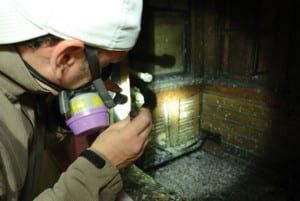
by Pigeon Patrol | Feb 6, 2014 | Bird Deterrent Products, Pigeon Patrol's Services, Pigeon Spikes, Pigeons in the News

Disgruntle tenant has gone to the birds
Pigeon Patrol called out to help with the roosting pigeons.
A North Vancouver man is crying foul over the effort he says he had to go through to get his landlord to deal with an unhealthy mess of pigeon poop lying inches deep outside his apartment.
“There’s certain standards they are supposed to abide by,” said Michael Ravenscroft, who rents an apartment at 107 West 1st Street.
Ravenscroft said he complained to his property management company, the City of North Vancouver and the health department for a month about the problem before anyone took notice.
“Any other situation where there’s a biohazard, they have a hazmat team come in,” said Ravenscroft. “It’s taken way too lightly.”
Ravenscroft said any time he’s called the authorities, to ask that the property owners be ordered to clean up the pigeon droppings, “They say it’s done. It’s not done.”
Ravenscroft said he first became concerned there might be a problem when he smelled something bad in one area of his apartment and couldn’t find the source, no matter how much he cleaned. It was only when he looked outside, to one of two light shafts running down the middle of the heritage building, that he realized what the problem was: layers of pigeon droppings and decomposing pigeon carcasses.
Until recently, Ravenscroft said he had a hard time getting anyone to take the issue seriously.
Pigeons, that often make nests in covered areas of buildings, are known to carry diseases that can be transferred to humans.
Pigeon droppings can carry funguses and – more rarely – an infectious disease that can be contracted by anyone breathing in dried droppings.
Paul Markey, environmental health officer for Vancouver Coastal Health, said the risk is greatest for people actually cleaning the mess rather than living near it.
Markey said a health officer met the property manager on site last week and received assurances the light shaft areas will be cleaned.
Markey added that a number of pigeon-proofing measures have already been placed around the building – including metal spikes that prevent pigeons and other birds from roosting.
He said those will now have to be added to the areas of the building above the light shafts.
Joanne Stevens of Living Balance, the property management company for the building, said she’s aware of the problem and is arranging for cleanup and further pigeon-proofing.
Andrew MacBain of Pigeon Patrol, a Lower Mainland company that specializes in bird-proofing, said he’s taken a look at the problem and will be submitting a plan to get all areas cleaned up by the end of the week.
Pigeons are a huge pest problem all over the Lower Mainland, said MacBain – roosting on ledges, apartment balconies or under awnings. MacBain said his company manufactures and installs spikes to deter the birds, as well as netting and Ultrasonic and sonic devices that scare birds away with high-pitched frequencies as well as sounds that imitate predators.
He adds there’s no shortage of business.
– See more at: http://www.nsnews.com/news/tenant-raises-stink-over-pigeon-filth-1.347112#sthash.ZEk5Z4pK.dpuf
A North Vancouver man is crying foul over the effort he says he had to go through to get his landlord to deal with an unhealthy mess of pigeon poop lying inches deep outside his apartment.
“There’s certain standards they are supposed to abide by,” said Michael Ravenscroft, who rents an apartment at 107 West 1st Street.
Ravenscroft said he complained to his property management company, the City of North Vancouver and the health department for a month about the problem before anyone took notice.
“Any other situation where there’s a biohazard, they have a hazmat team come in,” said Ravenscroft. “It’s taken way too lightly.”
Ravenscroft said any time he’s called the authorities, to ask that the property owners be ordered to clean up the pigeon droppings, “They say it’s done. It’s not done.”
Ravenscroft said he first became concerned there might be a problem when he smelled something bad in one area of his apartment and couldn’t find the source, no matter how much he cleaned. It was only when he looked outside, to one of two light shafts running down the middle of the heritage building, that he realized what the problem was: layers of pigeon droppings and decomposing pigeon carcasses.
Until recently, Ravenscroft said he had a hard time getting anyone to take the issue seriously.
Pigeons, that often make nests in covered areas of buildings, are known to carry diseases that can be transferred to humans.
Pigeon droppings can carry funguses and – more rarely – an infectious disease that can be contracted by anyone breathing in dried droppings.
Paul Markey, environmental health officer for Vancouver Coastal Health, said the risk is greatest for people actually cleaning the mess rather than living near it.
Markey said a health officer met the property manager on site last week and received assurances the light shaft areas will be cleaned.
Markey added that a number of pigeon-proofing measures have already been placed around the building – including metal spikes that prevent pigeons and other birds from roosting.
He said those will now have to be added to the areas of the building above the light shafts.
Joanne Stevens of Living Balance, the property management company for the building, said she’s aware of the problem and is arranging for cleanup and further pigeon-proofing.
Andrew MacBain of Pigeon Patrol, a Lower Mainland company that specializes in bird-proofing, said he’s taken a look at the problem and will be submitting a plan to get all areas cleaned up by the end of the week.
Pigeons are a huge pest problem all over the Lower Mainland, said MacBain – roosting on ledges, apartment balconies or under awnings. MacBain said his company manufactures and installs spikes to deter the birds, as well as netting and sonic devices that scare birds away with high-pitched frequencies as well as sounds that imitate predators.
He adds there’s no shortage of business.
– See more at: http://www.nsnews.com/news/tenant-raises-stink-over-pigeon-filth-1.347112#sthash.ZEk5Z4pK.dpuf
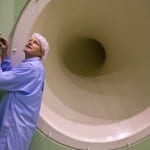
by Pigeon Patrol | Feb 4, 2014 | Bird Deterrent Products, Pigeon Patrol's Services, UltraSonic Bird Control
 Pigeon Patrol Products and Services wonder if Ultrasonic sound can kill you? The short answer is “yes”.
Pigeon Patrol Products and Services wonder if Ultrasonic sound can kill you? The short answer is “yes”.
The Space Shuttle’s Mobile Launch Platform used to dump 300,000 gallons of water onto the platform during launch, to absorb the intense acoustic energy that would otherwise damage the Shuttle. Giant air horns, using nitrogen gas to produce sounds as loud as 154 decibels.
The question is, is 154 decibels enough to kill you? In all honesty, probably not — unless, perhaps, you were stuck with your head inside the horn for a prolonged period. 150 decibels is usually considered enough to burst your eardrums, but the threshold for death is usually pegged at around 185-200 dB. A passenger car driving by at 25 feet is about 60 dB, being next to a jackhammer or lawn mower is around 100 dB, a nearby chainsaw is 120 dB. Generally, 150 dB (eardrum rupture) is only achieved if you stand really close to a jet aircraft during take-off or you’re near an explosive blast.
The general consensus is that a loud enough sound could cause an air embolism in your lungs, which then travels to your heart and kills you. Alternatively, your lungs might simply burst from the increased air pressure.
High-intensity ultrasonic sound (generally anything above 20KHz) can cause physical damage. Some very low frequencies (infrasound) can apparently cause your eyeballs to vibrate, making it very hard to see.
Pigeon Patrol Products & Services is the leading manufacturer and distributor of bird deterrent (control) products in Canada. Pigeon Patrol products have solved pest bird problems in industrial, commercial, and residential settings since 2000, by using safe and humane bird deterrents with only bird and animal friendly solutions. At Pigeon Patrol, we manufacture and offer a variety of bird deterrents, ranging from Ultra-flex Bird Spikes with UV protection, Bird Netting, 4-S Gel and the best Ultrasonic and audible sound devices on the market today.
Voted Best Canadian wholesaler for Bird Deterrent products four years in a row. Now shipping World Wide.
Read the full story at:
Can a loud enough sound kill you?

by Pigeon Patrol | Jan 28, 2014 | Bird Deterrent Products, Bird Netting, Pigeon Spikes, Pigeons in the News, UltraSonic Bird Control
 As many as 1000 pigeons trapped or killed by a pest control firm in Amsterdam end up on dinner plates as pate. There have been massive amounts of pigeons around the area that they’ve been called sky vermin. This has led to a pest exterminating company to the idea of selling pigeons to butchers. After being caught, pigeons are sold to butchers across the city to be made into pate.
As many as 1000 pigeons trapped or killed by a pest control firm in Amsterdam end up on dinner plates as pate. There have been massive amounts of pigeons around the area that they’ve been called sky vermin. This has led to a pest exterminating company to the idea of selling pigeons to butchers. After being caught, pigeons are sold to butchers across the city to be made into pate.
With the use of Bird Deterrents such as Ultra-Bird Spikes or Bird Netting, the areas with great amounts of pigeons could have been controlled or the products could have been put in place as an animal friendly solution.
Pigeons spread disease easily due to the fact that they can travel great distances, harbor over forty different types of parasites, and can host sixty different types of diseases. Without proper health regulations, this dish poses a lot of health risks.
As Pigeons are not protected, the pest control company can catch and do as they please with them. I don’t know how they are treating these animals but let’s hope they are as animal friendly as Pigeon Patrol is.
Full Story: http://www.forbes.com/sites/ceciliarodriguez/2014/01/25/amsterdams-pigeons-turned-into-pate/
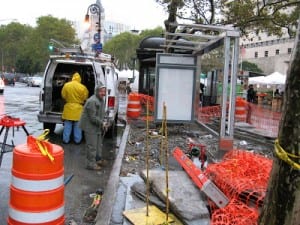
by Pigeon Patrol | Dec 28, 2013 | 4-S Gel Bird repellent, Bird Deterrent Products, Pigeon Spikes, Pigeons in the News
Pigeon Patrol wishes all the best in the new year to New Bedford — Southeastern Regional Transit Authority. The officials are taking long and short-term steps to reduce problems caused by pigeons roosting in the rafters of the downtown bus terminal.
 They will brighten the appearance of the terminal, reduce the noise and eliminate much of the problem of pigeons roosting inside the terminal, he said.
They will brighten the appearance of the terminal, reduce the noise and eliminate much of the problem of pigeons roosting inside the terminal, he said.
“It will drastically reduce the amount of space for them to stand on. It will be much more difficult for them to hang out there,” he said.
Rousseau said SRTA’s maintenance staff regularly battles the problem of pigeon droppings by power washing the pavement. However, the work has to be done at night because of the steady flow of buses during the day and he said crews have not been able to wash it lately because of the cold weather.
“Today (Friday) was the first day our guys were able to do that,” he said of the powerwashing.
I do agree that taking steps like installing bird deterrents lie bird spikes or pigeon spikes will help to control the pigeons and reduce the pigeon problems. For the whole story click the link below:
http://www.southcoasttoday.com/apps/pbcs.dll/article?AID=/20131228/NEWS/312280332








 Pigeon Patrol Products and Services wonder if Ultrasonic sound can kill you? The short answer is “yes”.
Pigeon Patrol Products and Services wonder if Ultrasonic sound can kill you? The short answer is “yes”.
 As many as 1000 pigeons trapped or killed by a pest control firm in Amsterdam end up on dinner plates as pate. There have been massive amounts of pigeons around the area that they’ve been called sky vermin. This has led to a pest exterminating company to the idea of selling pigeons to butchers. After being caught, pigeons are sold to butchers across the city to be made into pate.
As many as 1000 pigeons trapped or killed by a pest control firm in Amsterdam end up on dinner plates as pate. There have been massive amounts of pigeons around the area that they’ve been called sky vermin. This has led to a pest exterminating company to the idea of selling pigeons to butchers. After being caught, pigeons are sold to butchers across the city to be made into pate.
 They will brighten the appearance of the terminal, reduce the noise and eliminate much of the problem of pigeons roosting inside the terminal, he said.
They will brighten the appearance of the terminal, reduce the noise and eliminate much of the problem of pigeons roosting inside the terminal, he said.